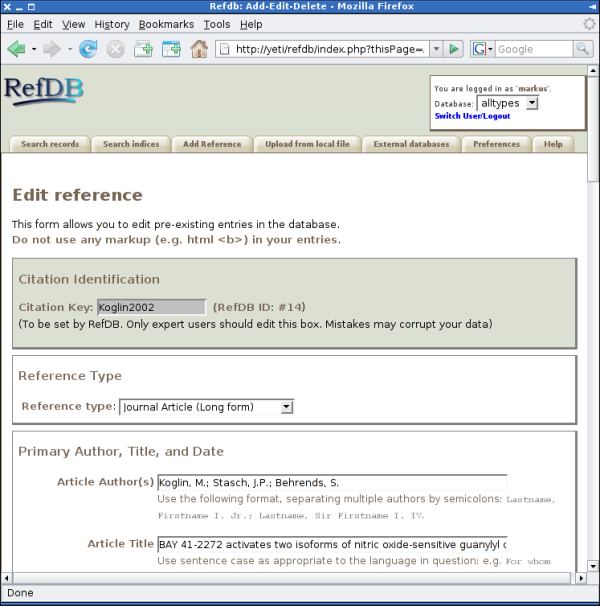Last Updated on November 18, 2022
RefDB is a reference database and bibliography tool for SGML, XML, and LaTeX/BibTeX documents. It allows users to share databases over a network.
It can be used from the command-line, using a PHP-based web interface, from text editors (Emacs, Vim), and it contains a SRU server.
This tool is suitable for standalone use for the purpose of self-archiving, but can be used as a institutional repository as well. Data storage proper is done in one of several supported SQL database engines (MySQL, PostgreSQL and SQLite).
Features include:
- Query Features:
- Simple search to find references that match a word or phrase.
- Simple field-based search.
- Advanced query.
- Use citation key or digital objects identifier.
- Automatic processing of DockBook, TEI and LaTeX documents.
- Formatted bibliographies can be created automatically from DocBook SGML/XML and TEI XML documents. This does not require any changes or extensions to the DTDs. RefDB can also be integrated as a data source into the LaTeX/BibTeX workflow. Finally, external applications can retrieve raw bibliographies in either risx or MODS formats via the SRU interface.
- Both the DTD-based versions (V.4.x, P4) and the schema-based versions (V.5.x, P5) of DocBook and TEI are supported.
- RefDB is extensible in terms of the supported document types: support for new document types can be added without hacking the tool itself (you only need to hack stylesheets).
- Citation and reference styles can be defined in XML to match the weirdest requirements of journals and publishers.
- RefDB supports numerical, author/year, and citation key citation styles.
- Sophisticated shell scripts and makefiles take care of the document transformations. The whole process is transparent to the user as all he needs to do is e.g. type make pdf to turn his document into a PDF file with formatted citations and bibliographies.
- Inserts and formats bibliographies for submission to a journal or publisher.
- Extended notes can be linked to one or more references, authors, periodicals, or keywords to create topics or material collections.
- Supports a variety of bibliographic formats, including BibTeX, Endnote, ISI, RIS, PubMed, MODS XML, MARC, Medline, and Copac.
- Creates output in HTML, XHTML, TEI and DockBook formats.
- Portable and runs on a number of operating systems.
- Uses a SQL database engine to store the references, notes, and the bibliography styles.
Website: refdb.sourceforge.net
Support:
Developer: RefDB Development Team
License: GNU GPL v2

RefDB is written in C. Learn C with our recommended free books and free tutorials.
Return to Bibliography Tools Home Page | Return to LaTeX Tools Home Page
| Popular series | |
|---|---|
| The largest compilation of the best free and open source software in the universe. Each article is supplied with a legendary ratings chart helping you to make informed decisions. | |
| Hundreds of in-depth reviews offering our unbiased and expert opinion on software. We offer helpful and impartial information. | |
| The Big List of Active Linux Distros is a large compilation of actively developed Linux distributions. | |
| Replace proprietary software with open source alternatives: Google, Microsoft, Apple, Adobe, IBM, Autodesk, Oracle, Atlassian, Corel, Cisco, Intuit, SAS, Progress, Salesforce, and Citrix | |
| Awesome Free Linux Games Tools showcases a series of tools that making gaming on Linux a more pleasurable experience. This is a new series. | |
| Machine Learning explores practical applications of machine learning and deep learning from a Linux perspective. We've written reviews of more than 40 self-hosted apps. All are free and open source. | |
| New to Linux? Read our Linux for Starters series. We start right at the basics and teach you everything you need to know to get started with Linux. | |
| Alternatives to popular CLI tools showcases essential tools that are modern replacements for core Linux utilities. | |
| Essential Linux system tools focuses on small, indispensable utilities, useful for system administrators as well as regular users. | |
| Linux utilities to maximise your productivity. Small, indispensable tools, useful for anyone running a Linux machine. | |
| Surveys popular streaming services from a Linux perspective: Amazon Music Unlimited, Myuzi, Spotify, Deezer, Tidal. | |
| Saving Money with Linux looks at how you can reduce your energy bills running Linux. | |
| Home computers became commonplace in the 1980s. Emulate home computers including the Commodore 64, Amiga, Atari ST, ZX81, Amstrad CPC, and ZX Spectrum. | |
| Now and Then examines how promising open source software fared over the years. It can be a bumpy ride. | |
| Linux at Home looks at a range of home activities where Linux can play its part, making the most of our time at home, keeping active and engaged. | |
| Linux Candy reveals the lighter side of Linux. Have some fun and escape from the daily drudgery. | |
| Getting Started with Docker helps you master Docker, a set of platform as a service products that delivers software in packages called containers. | |
| Best Free Android Apps. We showcase free Android apps that are definitely worth downloading. There's a strict eligibility criteria for inclusion in this series. | |
| These best free books accelerate your learning of every programming language. Learn a new language today! | |
| These free tutorials offer the perfect tonic to our free programming books series. | |
| Linux Around The World showcases usergroups that are relevant to Linux enthusiasts. Great ways to meet up with fellow enthusiasts. | |
| Stars and Stripes is an occasional series looking at the impact of Linux in the USA. | |